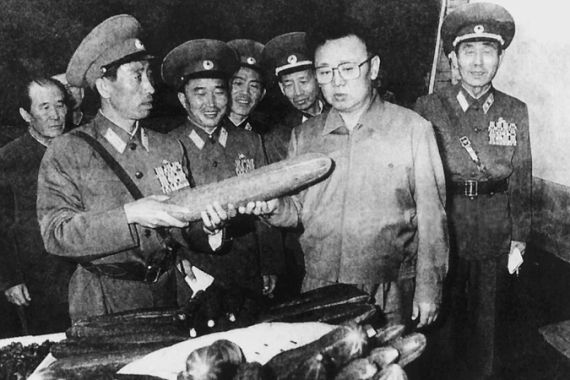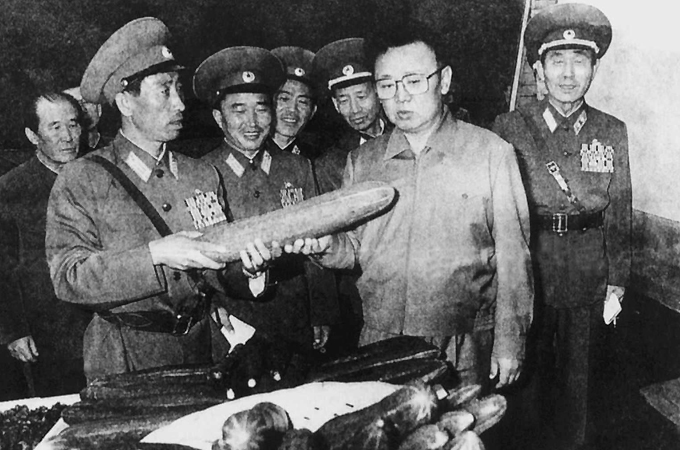Obituary: Kim Jong-il
Reclusive leader was revered at home, according to state propaganda, but viewed as a temperamental tyrant by the West.

Kim Jong-il, the North Korean leader revered at home by a propaganda machine that turned him into a demi-god and vilified in the West as a temperamental tyrant with a nuclear arsenal, has died, North Korean state television reported on Monday.
Kim, who was said to be 69 years old, died on Saturday following a heart attack, it said, although even the exact age of the mysterious leader was the subject of controversy.
Kim had long been speculated to have been in ill-health and was rumoured to have suffered a stroke in August 2008.
The reclusive “Dear Leader”, as he was known, took over the reins of power in 1994 after the death of his father, the “Great Leader” and founder of North Korea, Kim Il-sung.
Kim Jong-il never became the North Korean president, a role reserved for his father, who, despite his death, continues to hold the title of North Korea’s “Eternal President” and is bestowed god-like status by state propaganda.
North Korean propaganda said Kim Jong-il was born on February 16, 1942, at a secret camp for rebel fighters led by his father near Korea’s famed Mount Paektu. But analysts say he was likely born in Siberia in the Soviet Union while his father and other Korean communist exiles were receiving military and other training.
Kim spend his early years in China to keep him safe during the 1950-53 Korean War, analysts say, before going to Pyongyang’s Kim Il-sung University where he studied the great works of communist thinkers as well as his father’s revolutionary theory, state propaganda said.
Military first
Other than leading what is arguably the world’s most isolated state, North Korea’s Kim Jong-il also headed the world’s only communist dynasty.
 |
| Inspecting cucumbers harvested at an army base. An estimated 2 million died under his rule [AFP] |
When Kim Il-sung died, official mourning lasted for three years. He was memorialised in a 30-metre-high bronze statue that dominates the centre of Pyongyang while his embalmed body is displayed inside the massive Kumsusan Memorial Palace.
Such pilgrimages cement the all-encompassing personality cult surrounding father and son – a cult that formed the foundation on which Kim Jong-il built his legitimacy.
Kim Jong-il faithfully carried out his father’s policy of “military first,” devoting much of the country’s scarce resources to its troops – even as his people suffered from a prolonged famine – and built the world’s fifth-largest military.
He sought to build up the country’s nuclear arms arsenal, which culminated in North Korea’s first nuclear test explosion, an underground blast conducted in October 2006. Another test came in 2009, prompting UN sanctions.
George W Bush, then US president, denounced North Korea in 2002 as a member of an “axis of evil” that also included Iran and Iraq.
“Look, Kim Jong-il is a dangerous person. He’s a man who starves his people. He’s got huge concentration camps. And … there is concern about his capacity to deliver a nuclear weapon,” Bush said in 2005.
Harsh repression
Portrayed variously as a paranoid nuclear-armed madman, a cognac-swilling playboy and a film buff with a vast archive of Hollywood classics, little is known with certainty about his life and his grip on power.
So little was known about him until his father’s death that many analysts predicted that without the elder Kim at the helm, the regime would quickly collapse.
Madeleine Albright, one of the few Western officials to deal directly with Kim during her time as US secretary of state, disputes accounts that Kim was “peculiar”. She characterised Kim as intelligent and well-informed, saying the two had wide-ranging discussions during her visits to Pyongyang when Bill Clinton was US president.
“I found him [Kim] very much on top of his brief,” she said.
But like his father, Kim Jong-il has run the country with an iron fist. Anyone stepping out of line has met with harsh repression.
According to an estimate by the US Committee for Human Rights in North Korea, a non-governmental organisation based in Washington DC, as many as 200,000 political prisoners are held in North Korean detention camps.
To maintain this rigid control over his country, Kim Jong-il has apparently been content to allow whole portions of the population to starve to death.
In the late 1990s an estimated two million North Koreans – about 10 per cent of the population – died in a famine caused by a combination of economic mismanagement and natural disaster.
While Kim reportedly dined on the finest caviar, he refused to allow all but the most basic international aid to reach the country’s population – and even that was often diverted to supply the armed forces.
Kim has three known sons. He is believed to have anointed the youngest, Kim Jong-un, to succeed him.